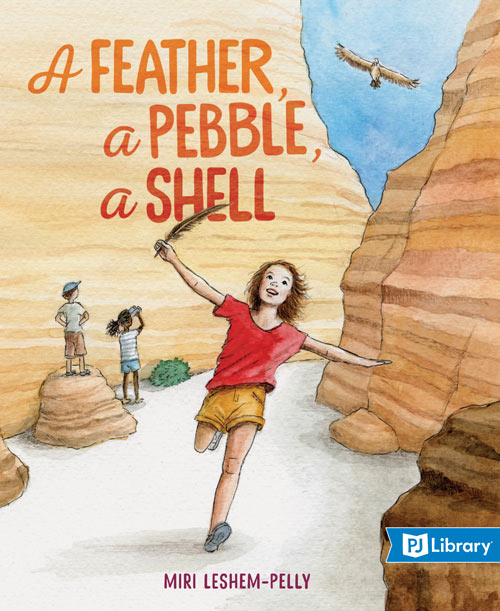
Picture it – your family is hiking through the woods, strolling by the water at the beach, or even walking back to the car after grocery shopping, when suddenly your child notices something extraordinary: a butterfly wing, a piece of sea glass, a ladybug. Do you pick it up and bring it home? Or leave it be? Nature gives us many gifts, but are they gifts to keep or to leave behind for others to enjoy as well?
This month PJ Library adds a new book, A Feather, a Pebble, a Shell, by Miri Leshem-Pelly, to our lineup. The child in this story explores Israel’s many natural wonders without disturbing them. She leaves them “where they belong . . . for you to find.” And indeed, millions of tourists visit Israel every year to swim in a tropical sea, hike in the desert, explore underground caves, and enjoy many lovely parks and nature walks — all in one trip.
One midrash (an ancient commentary on Jewish text) says that when God created the world, God warned Adam not to destroy any part of the world because it would be up to human beings to fix it. That story sets the stage for the concept of tikkun olam (Hebrew for “repairing the world”). Jewish tradition holds that it is our responsibility to take care of and repair the world in which we live. When we leave everything as close as possible to how it was when we found it, the natural world can continue to give us so many beautiful things to see, hear, and touch.
Judaism has specific blessings for all sorts of things, including different foods, activities, and milestones. There are also special blessings to say when we encounter great natural beauty or witness an amazing phenomenon such as thunder, lightning, or an earthquake. These blessings remind us of our responsibility to the earth: We must care for the planet so that it goes on caring for us. And as we do so, we can find elevation and inspiration in our ongoing awe at the complex beauty of existence.
Discuss
- Why do you think the child in this story leaves the items she finds behind?
- Can you describe a special treasure that you once spotted in nature? Why were you so attracted to it?
- What places do you like to explore where you live?
Read
by Rinat Primo
Recommended for ages 5 to 6
Of all the flowers in their favorite field, the children of the Rainbow Kindergarten like the dandelions best. When they discover the field will be dug up to make room for new apartments, they come up with a way to spread the dandelion’s joy all over town.
by Martin Lemelman
Recommended for ages 8 and up
The Judean date palm withered into extinction after the Jewish exile from Israel. Centuries later, archaeologists discovered seeds of the prized plant in the ruins of the Masada fortress, the last stronghold of Jewish rebellion against the Roman Empire. Can Dr. Sarah Sallon and Dr. Elaine Solowey bring these long-gone trees back to life?
by Rinat Hoffer
Recommended for ages 5 to 6
When Shani gets new shoes for Rosh Hashanah, she doesn’t throw away the shoebox; she reuses it for holidays throughout the Jewish year! Just when the box starts to wear out, Rosh Hashanah comes around again.
More
All About Tikkun Olam
Tour Israel With These Picture Books
What’s Jewish About Taking Care of the Earth?
July 1, 2024